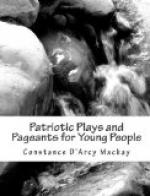DEBORAH (with a toss). You speak as if you and Industry were boon companions.
FRANKLIN. And what better companion could I have? Heaven helps them that help themselves.
DEBORAH (witheringly). ’Tis a fine thing to have high hopes, I doubt not.
FRANKLIN (blithely). Oh, I have more than hopes, Mistress Deborah; for he that lives upon hope will die fasting. To apply one’s self right heartily is to do more than hope. Sloth makes all things difficult; but industry all things easy. You are not eating, Mistress Deborah. (She rises.) Have my blunt ways offended you? Have I again displeased you? [Footnote: From “Poor Richard’s Almanac.”]
DEBORAH (with chilling dignity). You could not an you tried, Master Franklin. I was but going to fetch the tea-kettle.
FRANKLIN (starting up). If I can help you—
DEBORAH (still frostily). I thank you, I am in no need of help. A-ah!
[With a cry she drops the kettle.
FRANKLIN. You have burned yourself, Mistress Deborah! The poor little hand! (He tears up his handkerchief.) Let me bandage it for you! It is sorely blistered!
DEBORAH (tears in her voice the while she submits her hand to him). I can tolerate blisters, Master Franklin. They are far less irksome than—than——
FRANKLIN (gravely bandaging her hand). Than journeymen printers who eat their bread in the street. Perhaps you are right, Mistress Deborah. I trust that the blisters will soon heal; and that the memory of the journeyman printer will not trouble you further.
DEBORAH (as the church-bells begin to ring without). The memory of a chance traveler is easily forgot, Master Franklin.
ELIZABETH (outside door, left). Come, Deborah, we shall be late! Come quickly, child! (Deborah snatches up her cloak.) Bid Benjamin Franklin to wait my husband’s return. He would talk to him further concerning books. Come, Deborah!
[Exit Deborah, left, without a glance at Franklin.
FRANKLIN (dropping into chair by secretary, right). Do blisters burn as keen as words, I wonder? “Chance travelers...easily forgot!” (Sits with bowed head.)
[Deborah stands again in doorway at left, sees him, comes to him swiftly and remorsefully.
FRANKLIN (raises his head; sees her). Is it—
DEBORAH. ’Tis naught—naught but Deborah Read come to say to you—to say to you—that she should have remembered that you were a stranger in a city full of strangers. (Pleadingly.) Indeed, indeed I did not mean to hurt you! I do not mind your rusty clothes; I do not mock your—your faded hat. I—I have been full of foolish pride. Will you forgive me?
FRANKLIN (rising; amazed). Deborah!
DEBORAH (hurrying on). I had not meant to laugh at you this morning. Will you forgive that, too?
FRANKLIN (moved). Deborah!
DEBORAH.
I know I sometimes judge by foolish standards.
Will you forgive?




